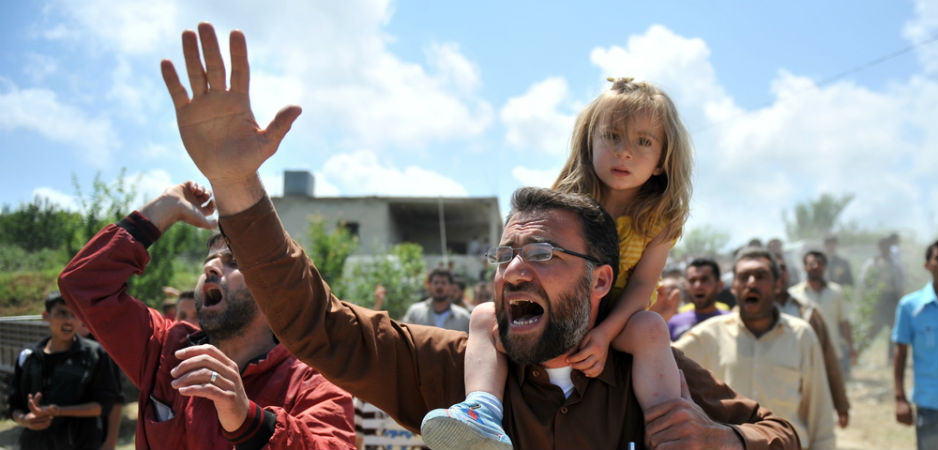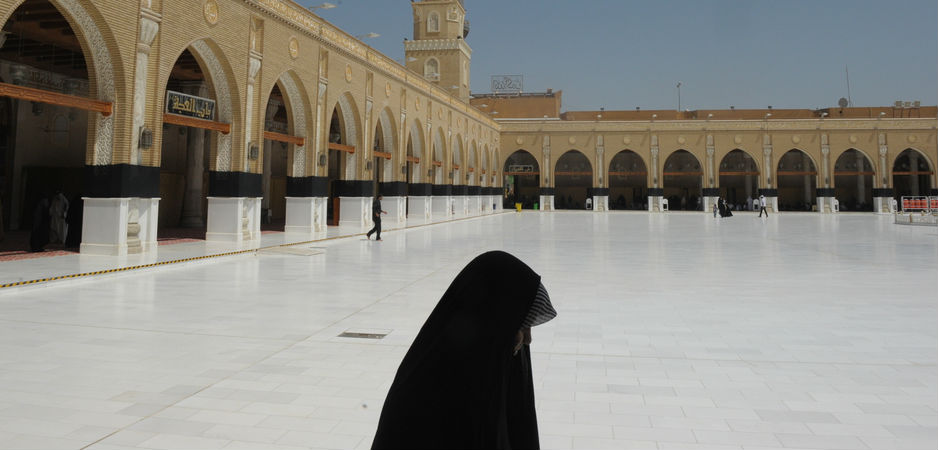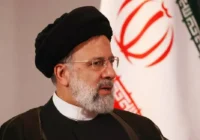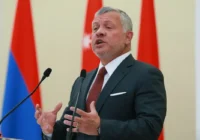A rapacious, repressive regime facing regional setbacks and economic hardship turns to religious radicalism to retain its hold on power.
In Act I, Scene 4 of Hamlet, the cold air “bites shrewdly” and the ghost of the dead king bursts upon the stage “horridly to shake our disposition.” These days, the long buried ghost of the Sunni-Shia schism is in the midst of a cosmic dance of destruction. The Saudis have begun 2016 by executing 47 people in a single day.
Some of those sentenced were juveniles as young as 15. The prosecution most kindly requested the death by crucifixion of 17-year-old Dawood al-Marhoon while refusing him a lawyer. His crime was participating in an anti-government protest, for which he was tortured and forced to sign a blank document that miraculously turned into his confession.
In 2015, beheadings soared in Saudi Arabia. As per many human rights groups, at least 157 people were killed last year. To be fair to the Saudis, Iran killed more than 1,000, Pakistan exceeded 315 and the Chinese probably take the gold medal in the number of executions. It is not the executions themselves, but the grisly manner in which the Saudis carry them out that evokes disgust in most parts of the world.
In 2003, the BBC interviewed the leading executioner of this terrifying kingdom, who recounted in grim detail how he chopped off heads and limbs with precision and poise. That those sentenced go through arbitrary proceedings, no due process and often torture before meeting their maker is an open secret. Marcellus’ words in that iconic ghost scene from Hamlet can be borrowed here: Something is rotten in the state of Saudi Arabia.
Horrific though the 47 executions may be, they would not have made headline news. They have made the news and caused a ruckus because of one of those killed was Sheikh Nimr al-Nimr, a leading Shia cleric from Saudi Arabia’s Eastern Province who opposed the House of Saud and its Bahraini ally. In 2011, Nimr interviewed with the BBC and declared that he was in favor of “the roar of the word against authorities rather than weapons … the weapon of the word is stronger than bullets.”
Unsurprisingly, he was arrested in 2012 after protests broke out in the long marginalized oil-rich Shia areas of the Eastern Province. During his arrest, Nimr was shot four times in the leg. As per reports, he was denied proper medical attention and tortured while awaiting a sham trial. Prosecutors called for Nimr’s execution by crucifixion, a punishment that according to the BBC involves beheading followed by public display of the decapitated body.
Saudi actions have been almost universally condemned and evoked fierce reactions among Shias. Protests have broken out in Kashmir, Bahrain and Pakistan against Nimr’s execution. Lebanon’s Hezbollah and Iraq’s Shia-led government are unsurprisingly furious.
The most extreme reaction has occurred in Tehran. Shia Iran, the Saudi kingdom’s regional and religious rival, is seething with rage. Iranian protesters stormed the Saudi Embassy in scenes reminiscent of 1979 when the US embassy suffered a similar fate. Ayatollah Ali Khamenei declared that Saudi Arabia faced “divine revenge” and the latter retaliated by accusing Iran of “blind sectarianism” as well as support of terrorism. Riyadh has since severed diplomatic ties with Tehran. The roiling waters of the Middle East are now boiling.
Some take the point of view that the House of Saud is tottering. The rather prolific Ibn Saud and his sons have left behind plenty of progeny who constantly jostle for power, influence and wealth. Although the Saudi royals are formally beholden to Wahhabism, a puritanical and reactionary form of Islam, they are reputed to have a taste for the fine things in life. WikiLeaks revealed “a world of sex, drugs and rock’n’roll behind the official pieties of Saudi Arabian royalty.”
It is an open secret that maids from South and Southeast Asia are exploited, treated inhumanly and often raped. In a farcical case, a court ordered 200 lashes for a 19-year-old Shia woman who was raped by seven men. She was also duly packed off to prison, and her lawyer’s license was confiscated for apparently speaking to the media about the incident.
This author has heard horrific tales of Saudi brutality from poor Indians who go to the kingdom as cheap labor. In fact, the Saudis have a reputation of doing little except living off the proceeds of their oil money. When Saudi princes are not cavorting with prostitutes or snorting cocaine as reported in the BAE scandal, they fund radical Islamists who provide them legitimacy.
Diplomats, intelligence officials and journalists in many countries speak of the toxic influence of Saudi money. In 2015 at the Massachusetts Institute of Technology (MIT), a young Bangladeshi student declared in this author’s class that Saudi Arabia was destroying her country. The Saudi-funded radicalization of Pakistan is now well-chronicled even in the US. It is little surprise that Sunni Pakistan, a nation founded by a pork-eating Shia lawyer, is now a tough country for minorities.
The Saudi regime is increasingly running out of places to hide. It has very few friends left. In Yemen, Iranian-backed Houthis are causing the Saudis constant trouble. In Syria, the Russians, the French and even the Americans are weakening the Islamic State, an organization that the Saudis have long been suspected of sympathizing with if not supporting. The nuclear deal between Iran and the US weakens the Saudi position in the Middle East. The Saudis have been softened by years of oil money and rely on mercenaries that might be turning more ambitious with time.
 Most importantly, the oil-fueled party has ended abruptly and left everything in disarray. The Saudis decided to go nuclear in the oil-war to push out weaker rivals elsewhere. As per The Economist, the Saudis need oil to be around $85 a barrel to finance public spending and about $60 to keep the current account in balance. The International Monetary Fund predicted 20% deficits when the price hovered around the $50 mark, and today it hovers around $37.
Most importantly, the oil-fueled party has ended abruptly and left everything in disarray. The Saudis decided to go nuclear in the oil-war to push out weaker rivals elsewhere. As per The Economist, the Saudis need oil to be around $85 a barrel to finance public spending and about $60 to keep the current account in balance. The International Monetary Fund predicted 20% deficits when the price hovered around the $50 mark, and today it hovers around $37.
The Saudis have ruled their people with a simple social contract. They give them generous subsidies from the kingdom’s oil revenues. In return, the people support them. On December 29, the Saudis cut subsidies in an effort to reign in the deficit. This means higher prices for fuel, water and electricity as well as the gas used by industry. These economic reforms are painful and politically sensitive.
So, this is an excellent time for the House of Saud to stir the Sunni-Shia schism to gain public support. Syrian President Bashar al-Assad uses the same trick to fight rebels who belong to another tribe or religious denomination. The Islamic State has made inhuman religious radicalism its hallmark and Shia militias in Iraq emulate it. Five years ago, the Arab Uprisings broke out because Mohammed Bouazizi, a Tunisian fruit seller, immolated himself. Today, corruption, inflation, unemployment, sectarian strife and repression continue to be a daily feature of life in much of the Middle East and North Africa.
Many are questioning if the Arab Uprisings were worth it. They could do well to remember that the French Revolution led to the Reign of Terror and much war, but in the end, France is a more egalitarian and democratic place because of 1789. At some point, Assad, the Islamic State and the House of Saud will run out of steam, and the blood-dimmed tide shall recede in this long-suffering region.
*[You can receive “The World This Week” directly in your inbox by subscribing to our mailing list. Simply visit Fair Observer and enter your email address in the space provided. Meanwhile, please find below five of our finest articles for the week.]
The Middle East in 2016
Landon Shroder provides a round-up of where 2015 finished and what 2016 might look like in the Middle East.
There have not been many epochs in recent memory that come close to the confusion, complexity and chaos that have defined the modern Middle East in 2015.
In the past year alone, we have seen an acceleration of the conflict with the Islamic State (IS) on multiple fronts in Iraq, Syria, France, Tunisia, Turkey and Lebanon, among others; the largest refugee migration since World War II; Russian military intervention in Syria; more US boots on the ground inside Iraq; a brutal war in Yemen being led by Saudi Arabia; a potential unity government in Libya; and, of course, there was the signing of a landmark nuclear deal with Iran.
Did I forget something? Almost assuredly so, however, it is time to have a look at what 2016 might have in store for the Middle East. Are we expecting more of the same? Or will 2016 be the pinnacle year by which… Read more
The Asia Pacific in 2016
Shu-Wen Chye provides a round-up of the Asia Pacific in 2015, and highlights what to look for in 2016.
For many in the Asia Pacific, 2015 tested the political prowess and limits of the region. The year saw territorial disputes over the South China Sea; an imploding Rohingya refugee crisis in Myanmar; frightening forest fires in Indonesia and an environmental catastrophe that affected its neighbors for months; a Chinese currency devaluation that rocked the global economy; and Japan and South Korea’s landmark deal that aims to settle the issue of wartime “comfort women.”
But 2015 wasn’t all that bleak: ASEAN, or the Association of Southeast Asian Nations, created a regional trade bloc that was a decade in the making; Myanmar experienced a groundbreaking election; the ruling party in Singapore reasserted electoral power after the passing of Lee Kuan Yew; the Bandung spirit lived on through the Asia-Africa Conference; Xi Jinping and Narendra Modi flexed China and India’s soft (and hard) power muscles through their world tours; and Beijing abolished its… Read more
Health is Truly Wealth
On average, people are living longer than before, but they still suffer from diseases because of new pathogens, increased pollution and poor life choices.
Human beings generally like to live. Good health enables people to live long and fulfilling lives. The Internet has multiple definitions of health and good health. Yet the most commonly used definition continues to be the World Health Organization’s (WHO) version, which defines health as “a state of complete physical, mental and social well-being and not merely the absence of disease or infirmity.” The United Nations (UN) has declared that ensuring healthy lives and promoting well-being for all is one of its Sustainable Development Goals (SDG).
By many indices, human beings have never been healthier. Life expectancy has shot up, infant mortality has fallen, communicable diseases are under control, people are taller if not stronger than earlier generations and modern medicine has found cures for diseases that were debilitating until not too long ago. In the last 15 years alone, the number of people newly infected… Read more
US Visa Waiver Reform is Illogical, Unfair and Harmful
HR 158 is a rash anti-terror measure that sweepingly discriminates against Iranians in punishment for the recent attacks in Paris and San Bernardino.
Earlier this year, the P5+1 (the US, Russia, China, Britain, France and Germany) signed a monumental agreement with Iran to curb its nuclear program in exchange for the lifting of economic sanctions. The Joint Comprehensive Plan of Action (JCPOA) created a new atmosphere of trust between Iran and the West after decades of animosity stemmed from historical grievances. However, the US Congress could bring that all to a halt with the passage of a heavily politicized bill aimed at bolstering national security.
In the wake of the recent San Bernardino shooting that left 14 people dead, Republican House leaders introduced HR 158, which would restrict certain groups of people based on their ethnic background from entering the US without a visa. The Visa Waiver Program in its current form allows citizens from 38 different countries, many of which are in Europe, to travel to the US and… Read more
Woman-for-Blood Marriages Persist in Iraq
Iraq’s decline into chaos has led to the reemergence of compensation marriages to settle disputes between tribes.
The use of marriage as a means of averting blood-feuds and vendetta killings is ancient, found in texts from the Anglo-Saxon epic Beowulf to the 16th century Sharafnâma.
In the 1940s, Rupert Hay, administrator of the British Mandate in Iraq, wrote about the use of marriage to put an end to tribal blood feuds. “It is very common,” he wrote, “for a girl to be given away in marriage in payment of blood money. Thus if £90 is owing, the price of the blood of one man, the debt might be paid by the delivery of one girl, three cows and a donkey.”
These arrangements are termed al-Fusliya in Arabic and badal khueen (blood substitute) or jin be xwên (woman-for-blood) in Kurdish. Such “compensation” marriages have been recorded in Pakistan and Afghanistan and are increasingly found in modern Iraq. Here, tribes are an enduring method of social organization, in some cases predating Islam… Read more
The views expressed in this article are the author’s own and do not necessarily reflect Fair Observer’s editorial policy.
Photo Credit: Ash Carter
 We bring you perspectives from around the world. Help us to inform and educate. Your donation is tax-deductible. Join over 400 people to become a donor or you could choose to be a sponsor.
We bring you perspectives from around the world. Help us to inform and educate. Your donation is tax-deductible. Join over 400 people to become a donor or you could choose to be a sponsor.
Support Fair Observer
We rely on your support for our independence, diversity and quality.
For more than 10 years, Fair Observer has been free, fair and independent. No billionaire owns us, no advertisers control us. We are a reader-supported nonprofit. Unlike many other publications, we keep our content free for readers regardless of where they live or whether they can afford to pay. We have no paywalls and no ads.
In the post-truth era of fake news, echo chambers and filter bubbles, we publish a plurality of perspectives from around the world. Anyone can publish with us, but everyone goes through a rigorous editorial process. So, you get fact-checked, well-reasoned content instead of noise.
We publish 2,500+ voices from 90+ countries. We also conduct education and training programs
on subjects ranging from digital media and journalism to writing and critical thinking. This
doesn’t come cheap. Servers, editors, trainers and web developers cost
money.
Please consider supporting us on a regular basis as a recurring donor or a
sustaining member.
Will you support FO’s journalism?
We rely on your support for our independence, diversity and quality.











